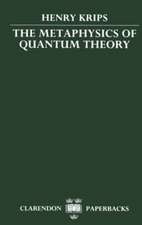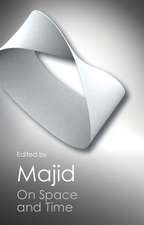Philosophy of Geometry from Riemann to Poincaré: Episteme, cartea 7
Autor R. Torrettien Limba Engleză Hardback – 30 noi 1978
| Toate formatele și edițiile | Preț | Express |
|---|---|---|
| Paperback (1) | 1225.48 lei 6-8 săpt. | |
| SPRINGER NETHERLANDS – 31 dec 1984 | 1225.48 lei 6-8 săpt. | |
| Hardback (1) | 1231.64 lei 6-8 săpt. | |
| SPRINGER NETHERLANDS – 30 noi 1978 | 1231.64 lei 6-8 săpt. |
Din seria Episteme
- 20%
 Preț: 306.88 lei
Preț: 306.88 lei - 18%
 Preț: 951.91 lei
Preț: 951.91 lei - 15%
 Preț: 647.08 lei
Preț: 647.08 lei - 15%
 Preț: 640.71 lei
Preț: 640.71 lei -
 Preț: 395.63 lei
Preț: 395.63 lei - 20%
 Preț: 993.42 lei
Preț: 993.42 lei - 18%
 Preț: 939.28 lei
Preț: 939.28 lei -
 Preț: 398.92 lei
Preț: 398.92 lei - 15%
 Preț: 644.30 lei
Preț: 644.30 lei - 15%
 Preț: 644.63 lei
Preț: 644.63 lei - 18%
 Preț: 953.20 lei
Preț: 953.20 lei - 20%
 Preț: 553.12 lei
Preț: 553.12 lei - 18%
 Preț: 894.46 lei
Preț: 894.46 lei - 15%
 Preț: 651.67 lei
Preț: 651.67 lei - 18%
 Preț: 954.62 lei
Preț: 954.62 lei - 15%
 Preț: 643.99 lei
Preț: 643.99 lei - 20%
 Preț: 328.79 lei
Preț: 328.79 lei -
 Preț: 380.25 lei
Preț: 380.25 lei -
 Preț: 388.90 lei
Preț: 388.90 lei - 15%
 Preț: 654.12 lei
Preț: 654.12 lei -
 Preț: 387.38 lei
Preț: 387.38 lei -
 Preț: 380.45 lei
Preț: 380.45 lei -
 Preț: 388.90 lei
Preț: 388.90 lei - 18%
 Preț: 948.79 lei
Preț: 948.79 lei
Preț: 1231.64 lei
Preț vechi: 1501.99 lei
-18% Nou
Puncte Express: 1847
Preț estimativ în valută:
235.73€ • 254.46$ • 197.66£
235.73€ • 254.46$ • 197.66£
Carte tipărită la comandă
Livrare economică 18 aprilie-02 mai
Preluare comenzi: 021 569.72.76
Specificații
ISBN-13: 9789027709202
ISBN-10: 9027709203
Pagini: 480
Ilustrații: XIII, 461 p.
Dimensiuni: 155 x 235 x 31 mm
Greutate: 0.84 kg
Ediția:1978
Editura: SPRINGER NETHERLANDS
Colecția Springer
Seria Episteme
Locul publicării:Dordrecht, Netherlands
ISBN-10: 9027709203
Pagini: 480
Ilustrații: XIII, 461 p.
Dimensiuni: 155 x 235 x 31 mm
Greutate: 0.84 kg
Ediția:1978
Editura: SPRINGER NETHERLANDS
Colecția Springer
Seria Episteme
Locul publicării:Dordrecht, Netherlands
Public țintă
ResearchCuprins
1 / Background.- 1.0.1 Greek Geometry and Philosophy.- 1.0.2 Geometry in Greek Natural Science.- 1.0.3 Modern Science and the Metaphysical Idea of Space.- 1.0.4 Descartes’ Method of Coordinates.- 2 / Non-Euclidean Geometries.- 2.1 Parallels.- 2.2 Manifolds.- 2.3 Projective Geometry and Projective Metrics.- 3 / Foundations.- 3.1 Helmholtz’s Problem of Space.- 3.2 Axiomatics.- 4 / Empiricism, Apriorism, Conventionalism.- 4.1 Empiricism in Geometry.- 4.2 The Uproar of Boeotians.- 4.3 Russell’s Apriorism of 1897.- 4.4 Henri Poincaré.- 1. Mappings.- 2. Algebraic Structures. Groups.- 3. Topologies.- 4. Differentiable Manifolds.- Notes.- To Chapter 1.- To Chapter 2.- 2.1.- 2.2.- 2.3.- To Chapter 3.- 3.1.- 3.2.- To Chapter 4.- 4.1.- 4.2.- 4.3.- 4.4.- References.
Recenzii
`...a carefull and scholarly discussion of the history and philosophy of geometry from the 1850's, marked by Riemann's generalized conception of space, and ending with Hilbert's axiomatics and Poincaré's conventionalism at the beginning of the century.'
The Modern Schoolman
`This is a deeply learned, scrupulously careful, very informative book which was well worth writing... In sum, Toretti has written carefully, with much insight, deep and broad learning, and sober judgement on a topic of profound difficulty and interest.'
Australian Journal of Philosophy
`Torretti has written a very useful book which helps fill a large gap in the literature on the philosophy of mathematics.'
The Philosophical Quarterly
`It delves into the contributions of many neglected writers and dispells myths concerning the contributions of others, which have too often been perpetuated in the philosophical literature... I suggest that it deserves to become a standard word.'
Dialogue
The Modern Schoolman
`This is a deeply learned, scrupulously careful, very informative book which was well worth writing... In sum, Toretti has written carefully, with much insight, deep and broad learning, and sober judgement on a topic of profound difficulty and interest.'
Australian Journal of Philosophy
`Torretti has written a very useful book which helps fill a large gap in the literature on the philosophy of mathematics.'
The Philosophical Quarterly
`It delves into the contributions of many neglected writers and dispells myths concerning the contributions of others, which have too often been perpetuated in the philosophical literature... I suggest that it deserves to become a standard word.'
Dialogue
















